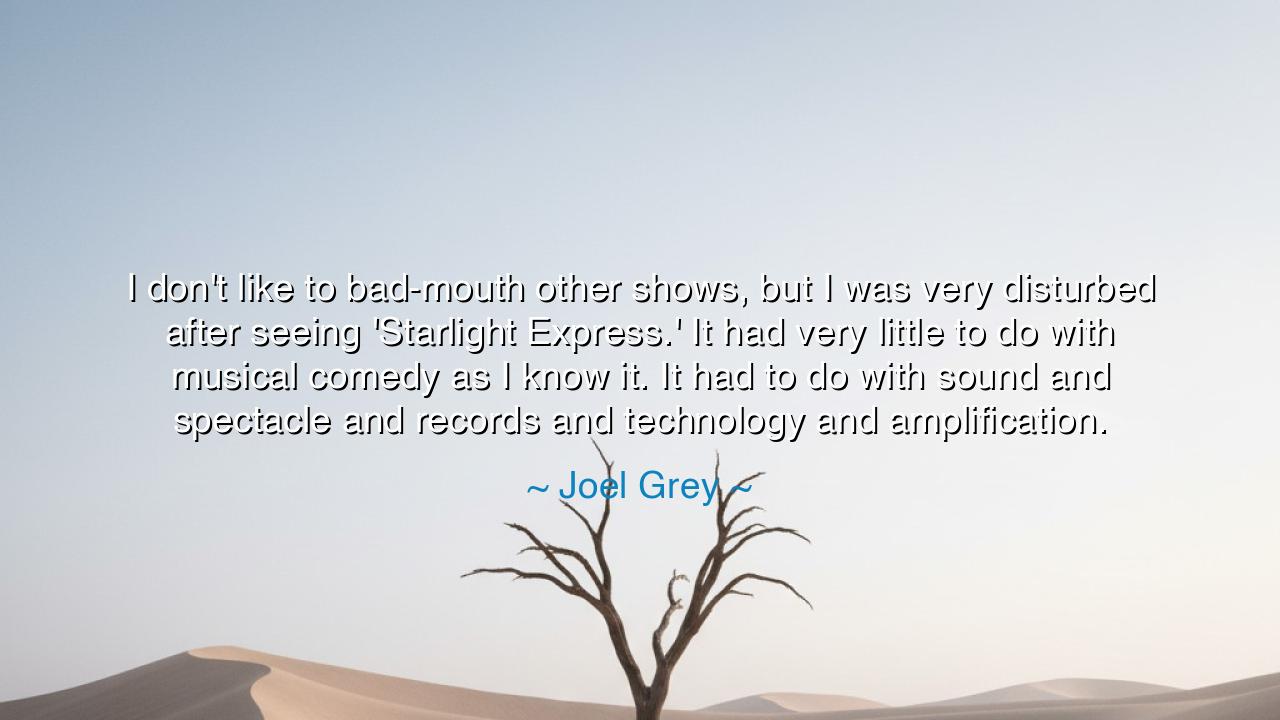
I don't like to bad-mouth other shows, but I was very disturbed
I don't like to bad-mouth other shows, but I was very disturbed after seeing 'Starlight Express.' It had very little to do with musical comedy as I know it. It had to do with sound and spectacle and records and technology and amplification.






Joel Grey, a master of stage and song, once spoke with the candor of a guardian of tradition: “I don’t like to bad-mouth other shows, but I was very disturbed after seeing Starlight Express. It had very little to do with musical comedy as I know it. It had to do with sound and spectacle and records and technology and amplification.” In these words, he laments the passing of one era into another—the fading of the intimate art of storytelling into the glare of spectacle. His sorrow is not mere criticism but the cry of an artist who treasures the living spirit of the theatre, where human voice and raw emotion stand above machine and noise.
For the ancient heart of musical comedy was born not from machines, but from the soul itself. A voice, a gesture, a simple melody, and the communion of actor and audience—these were its pillars. Grey, in his reflection, draws a line between this tradition and the new wave he beheld in Starlight Express, a production bathed in lights, engines, and machinery. To him, the emphasis upon technology and amplification drowned the essence of theatre: the naked humanity, the laughter, the tear that springs from nothing more than the truth of performance.
We must understand that this conflict is not new. When the printing press emerged, many decried it as the death of memory, for no longer would men train their minds to recall great epics. When cinema was born, some proclaimed the theatre would wither and vanish, swallowed by the motion of pictures. Yet, though threatened, each art endured, transforming, retreating, or evolving, yet never wholly dying. Grey’s words echo this ancient cycle: the fear that in chasing brilliance of spectacle, we risk losing the soul of what was sacred.
Consider the tale of the Colosseum in Rome. It was not built for intimate drama, but for blood, for spectacle, for grand diversions that thrilled the masses. The intimacy of the stage, the nuance of the actor, was drowned by the roar of beasts and the cheers of crowds. And yet, the theatre, the art of words and music, survived alongside the Colosseum. Its voice never vanished. The lesson here is clear: though the tide of spectacle and technology may rise, the core of art—human expression—remains, waiting for those who seek it.
Grey’s warning is not to despise technology nor to curse the march of progress. Rather, it is a call to discernment. For when the balance tips too far, when machines overshadow men, when sound eclipses story, we risk confusing distraction for art. True theatre, like true storytelling, must never forget that it is the heart, not the machine, that moves us. Amplification may make the voice louder, but only sincerity makes it heard.
Therefore, O seekers of art, take this lesson to heart: welcome technology, but do not bow to it. Let it serve the story, not replace it. When you create, ask: does this dazzle illuminate the tale, or does it blind the audience to its soul? Does this spectacle bring us closer to truth, or drive us further into illusion? For the greatest art is not that which overwhelms, but that which pierces gently, leaving a mark that no thunder of machinery can erase.
So let Grey’s words echo across the generations: guard the essence of art. Use sound and spectacle as tools, but never let them become the master. Remember that the stage was born of breath and voice, of story and song, and that these shall outlast the brightest lights and the loudest amplifiers. In the end, it is not the spectacle we carry in our hearts, but the story told, the feeling stirred, the truth revealed—and these, no machine can replace.






AAdministratorAdministrator
Welcome, honored guests. Please leave a comment, we will respond soon